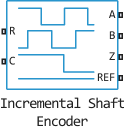Incremental Shaft Encoder
An encoder model that converts the angular position of a shaft into electrical pulses.
blockType: AcausalElectricPowerSystems.Sensors.IncrementalShaftEncoder
|
Path in the library: |
Description
The Incremental Shaft Encoder unit is a device that converts shaft angular position information into electrical pulses. The unit produces N pulses at ports A and B per shaft revolution, where N is the value that is set by the parameter Pulses per Revolution . Pulses A and B are 90 degrees phase shifted. If the shaft is rotating in the positive direction, A is ahead of B. The block produces one index pulse at port Z once per revolution. The edge of the Z pulse is always the same as the edge of the A pulse, and the length is equal to the length of the A and B pulses. The voltages at ports A, B and Z are defined with respect to port Ref.
Use this block if you need to model encoder signals, either to support the development of a decoding algorithm or to enable quantisation effects. Otherwise, use block Absolute Rotational Motion Sensor.
Assumptions and limitations
The Incremental Shaft Encoder block is not linearisable. For control project studies that require linearisation of the model, use block Absolute Rotational Motion Sensor.
Ports
Non-directional
R - shaft
scalar
Mechanical rotary port corresponding to the shaft of the encoder.
C - housing
scalar
Mechanical rotary port corresponding to the transducer housing.
A - voltage
scalar
Electrical port corresponding to A encoder pulses.
B - voltage
scalar
Electrical port corresponding to B encoder pulses.
Z - index or synchronisation
scalar
Electrical port corresponding to the Z encoder pulses (index or synchronisation).
REF is an electrical reference pin
scalar
Electrical port common to signals A, B and Z.
Parameters
Pulses per revolution - number of pulses per revolution
2 (By default)
Number of pulses generated on each of phases A and B per one revolution of the shaft.
Output voltage amplitude - output voltage amplitude
5 V (by default).
The encoder output voltage amplitude when the output signal level is high.
Index pulse offset relative to shaft initial angle - index pulse offset
`0 (By default)
Index pulse offset Z relative to shaft initial angle. This parameter allows you to set the initial location of the index pulse.
